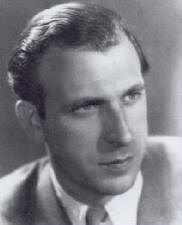Hans Hotter
Hans Hotter (born January 19, 1909 in Offenbach am Main , † December 6, 2003 in Munich ) was a German opera singer ( bass baritone ).
Life
After graduating from high school, Hans Hotter studied philosophy at the Ludwig Maximilians University in Munich and singing at the Munich Music Academy with Matthäus Römer. In 1930 he made his debut in Troppau . At the age of twenty-two he sang “Wanderer” in Siegfried , the third opera from Richard Wagner's opera cycle Der Ring des Nibelungen .
Other early stations were Breslau and Prague before he was hired in 1934 to Hamburg and 1937 to Munich. Here he worked on all the great baritone roles in the German field, especially Richard Wagner, but also Richard Strauss , in whose world premieres the operas Peace Day , Capriccio and Die Liebe der Danae Hotter took part. But he also often sang Mozart and Verdi . His career focused on the big houses in Munich and Vienna .
Between 1952 and 1966 he played regularly at the Bayreuth Festival . Especially as Holländer and Wotan , but also as Gurnemanz ( Parsifal ) and Hans Sachs , his interpretations achieved reference character.
Even in old age his charismatic figure gave ambivalent characters like Schigolch (in Lulu until 1992) imposing stage presence (last stage role; Munich, February 2001 Prince Regent in The Opera Ball by Richard Heuberger ). In addition, he rose to become one of the most important song singers of his generation. A recording of the century is his recording of the song cycle ' Die Winterreise' by Franz Schubert with Gerald Moore as piano accompanist from 1955. He also performed this work, which is very demanding in terms of voice technique, up to the 1990s with absolutely firm voice and safe in recitals on stage.
In 1955 he received the title of Bavarian Chamber Singer .
In 1977 he was appointed professor by the Vienna Music Academy . His master class for young singers, held in 1979 in the small hall of the Munich Gasteig, was recorded by Saarland radio and broadcast in the documentary "Hans Hotter" by Wolf-Eberhard von Lewinski on the ARD program.
In 1996 his autobiography was published by Kindler Verlag . In 1985 he was honored by the Munich tower writers with the Bavarian Poet Thaler. In 1998 he received the Ring of Honor of the City of Vienna .
His powerful, unmistakable baritone happily paired with a refined technique corresponding to the song. In addition, there was a power of representation of great intensity and intelligence.
Hans Hotter died at the age of 94 and was buried in the Solln forest cemetery in Munich.
literature
- Hans Hotter: "May was weighed for me ..." Memories , Verlag Kindler, Munich 1996, ISBN 3-463-40266-1
- Michael Jahn : Hans Hotter as a Verdi and Wagner interpreter , in: Verdi and Wagner in Vienna 4 . Verlag Der Apfel, Vienna 2015, pp. 95–102. ISBN 978-3-85450-325-5
Web links
- Works by and about Hans Hotter in the catalog of the German National Library
- Hans Hotter at Operissimo on the basis of the Great Singer Lexicon
- Hans Hotter on the pages of the Bayreuth Festival
- Interview on the curriculum vitae, part 1, sent in 1999 by BR-alpha (PDF access; 45 kB); Part 2 about online search in the alpha forum at www.br.de.
- Speech on the occasion of the 1999 Wilhelm Pitz Prize
- Obituary for Hans Hotter
- Audio recordings with and by Hans Hotter in the online collections of the Austrian Media Library (interviews, shellac recordings , radio broadcasts)
- ZeitZeichen : 01/19/1909 - birthday of the singer Hans Hotter
Individual evidence
- ↑ www.km.bayern.de Article contains a list of previous title holders
- ↑ knerger.de: The grave of Hans Hotter
| personal data | |
|---|---|
| SURNAME | Hotter, Hans |
| BRIEF DESCRIPTION | German opera singer (bass baritone) |
| DATE OF BIRTH | January 19, 1909 |
| PLACE OF BIRTH | Offenbach am Main |
| DATE OF DEATH | December 6, 2003 |
| Place of death | Munich |
